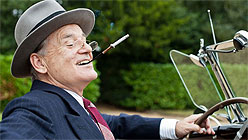In Hyde Park on Hudson — a sly, modestly subversive dramedy about a crucial weekend meeting between England’s King George VI and American President Franklin D. Roosevelt on the eve of World War II — the diffident young monarch (Samuel West) confides his frustration over his lifelong stutter while the two men enjoy a postprandial drink expressly forbidden by their womenfolk.
“That damn stutter, these useless legs,” says the president (Bill Murray), going on to bestow fatherly advice about the need to project confidence. That counsel gives George a much-needed ego boost while clarifying why, in real life, Roosevelt was never seen in public using his wheelchair. Ever the canny politician, Roosevelt tells the younger man that “people don’t want to see our flaws.”
Times have changed, I guess, but this hugely entertaining movie is about the wisdom and — with trenchant wit and sympathy — the human flaws in one of America’s most idealized heads of state.
Politically a lot was riding on that June 1939 weekend in the beautiful Hudson Valley retreat, to which the king and his prim bride, Elizabeth (Olivia Colman), had been sent to solicit American support in a war Britain couldn’t hope to win alone. Sharply written by an American who lives in the area, Richard Nelson, and directed by Brit Roger Michell (Notting Hill, Persuasion), Hyde Park is about the birth of the two countries’ special relationship — and at least one other, more intimate connection besides. The second one came to light when letters between the president and his fifth cousin, Daisy Suckley, were found under Daisy’s bed after her death.


